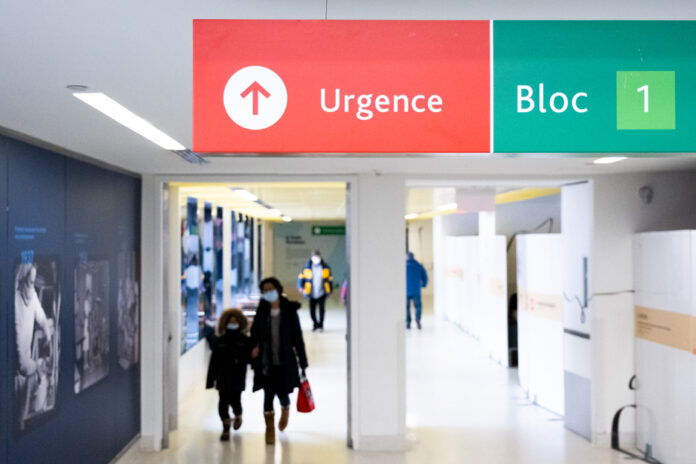(Quebec) The helping hand from Ottawa allows the Legault government to inject a billion in new money into health this year. The lion’s share goes to Christian Dubé’s Health Plan, which wants to keep vaccination centers to unclog hospitals and tackle the wait for surgery. Mental health gets “a footnote,” laments Quebec solidaire.
Although insufficient in the eyes of Quebec, the increase in federal health transfers benefits the aims of the Minister of Health, who presented his recovery plan for the health and social services network, damaged during the pandemic.
Quebec will extend one billion more per year for five years in its health network for additional investments of 5.6 billion by 2027-2028.
What do you think of this budget from Minister Eric Girard?
This is the bulk of the amounts it will receive annually thanks to the increase in federal transfers (about 4.7 billion over the next 5 years).
“The sums [of the federal] are modest on the whole of the financial framework”, nuanced the Minister of Finance, Eric Girard. “These dollars go everywhere because the federal priorities are personnel, home care, data, technologies, surgeries.”
The growth in expenditure for the health portfolio – the government’s largest budget item – is also greater than expected with 7.7% to reach 59 billion.
This increase was initially expected to be around 4.5% due to new federal funds and the upcoming renewal of collective agreements for health care workers. It also takes into account non-recurring expenses related to the pandemic.
Without these “adjustments”, spending growth would be much more modest, at 2.1%.
Minister Dubé will be able to count on a new kitty of 3 billion, including 612 million for the first year, to make the health system more efficient.
First surprise: Quebec will extend 272 million this year to keep vaccination and screening centers open, where prevention activities and other front-line services will be added to relieve congestion in the hospital system.
The Legault government is also injecting 60 million over two years (20 million this year, then 40 million next year) to create the Health Quebec agency, the next major project of the Minister of Health. His bill is expected next week in Quebec.
Christian Dubé promised that his reform, which aims to decentralize the health system to make it more efficient, would “shake” the columns of the temple by modifying the current structures. The announced budgets can be used to hire local managers, in particular.
All operational aspects of the Department will be centralized in this new agency, which will be headed by a CEO. The Department will retain its role of developing policies and broad guidelines.
La Presse reported on Monday that the minister hopes to hire the “top guns” of the industry to carry out his reform, which should come into force in 2024.
Another novelty, as of April 1, Quebec is reviewing the funding model for health establishments to tackle surgical waiting lists. That is to say, the establishments will obtain piece-rate funding, based on their volume of surgery.
The network already operates in this way for activities in radiation oncology, medical imaging and colonoscopy/digestive endoscopy. In the radiation oncology sector, Quebec recorded a 26% increase in productivity compared to 2014-2015.
The government hopes to boost “performance” and reduce waiting times for surgery. Waiting lists have been at record highs since the pandemic. As of December 31, 20,649 people have been waiting for surgery for over a year.
The goal is to “return” that number to pre-pandemic levels – around 3,000 – by 2024. Last year, Dubé said he wanted to hit that target by April 2023.
Quebec also plans to create 23 new specialized nurse practitioner (SNP) clinics over the next 5 years, including 6 next year, to increase access to the front line. The creation of these clinics will require total investments of 395 million by 2027-2028.
This type of clinic has proven itself in relieving congestion in emergency rooms that were hit by heavy traffic last fall. Last year, six IPS clinics from elsewhere were created. Their number will therefore reach 12 over the next year.
Despite the tragedies of Laval, Amqui and Rosemont which have shaken Quebec, mental health gets “a footnote” in the Girard budget, lamented Quebec solidaire. The Parti Québécois also denounced “unambitious sums”.
Quebec is investing $40 million more this year to increase access to mental health, homelessness and addiction services ($211 million over five years). Specifically to address mental health issues, the amounts reach $27 million in 2023-2024.
“It’s extremely important,” defended Minister Girard, who recalled that the government has made significant investments since taking office. “The needs have increased,” he admits.
Quebec continues its shift towards home care by investing 103 million this year. This is less than the CAQ’s electoral commitment, which provided for sums of 150 million in 2023-2024. The government plans to increase the pace of its investments to reach additional sums of $963.5 million within 5 years.
Quebec is giving itself five years (20 million per year) to contract the quarantine of private CHSLDs with the aim of “harmonizing the care offer”. The Legault government concluded a first pilot project last year which made it possible to contract three private establishments. We learn in the budget that the agreement process has made “significant” progress in recent months in 16 private CHSLDs. Quebec had in its sights to contract about twenty private establishments as of March 31, 2023.
Quebecers will be able to get vaccinated against shingles free of charge. The Legault government reserves 124.6 million over 5 years to provide free access to vaccination against this viral infection, which causes a painful rash. Quebec hopes to vaccinate 800,000 people during this period. The measure is due to come into force this year. Details will be specified later.















